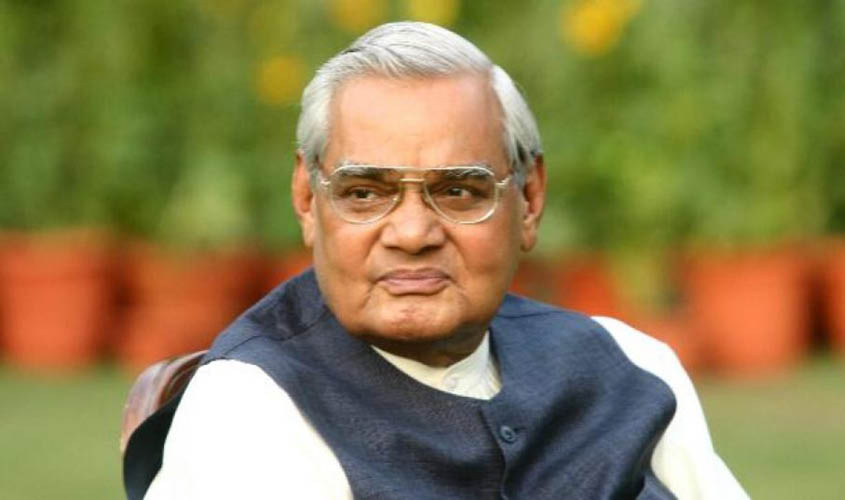Former Prime Minister Atal Bihari Vajpayee had a special relationship with Delhi, particularly the Lutyens’ zone, where he resided for over 60 years since first entering Parliament in 1957. He had a strong association with people, and the Jana Sangh cadre witnessed his transition from being a young Parliamentarian into a towering political personality. In fact, Delhi has been the nucleus around which both the Jana Sangh and the Bharatiya Janata Party expanded their base. All the front ranking leaders had something or the other to do with the historic capital, which became the home of lakhs of refugees who migrated from West Punjab after Partition comprising the core vote bank of the party, founded jointly by Shyama Prasad Mukherjee and Balraj Madhok.
Vajpayee was the rising star and old timers fondly recall that he was a frequent visitor to the Indian Coffee House in Connaught Place where today the Palika Bazar stands. The Coffee House was the favourite haunt of people from various walks of life including politicians, theatre personalities and scholars, besides ordinary citizens. The Board had successfully introduced coffee in a city where not many were at the time acquainted with this invigorating brew. However, the popularity of the Coffee House was indicative that the aromatic drink had gone down well with its patrons.
Many of the young MPs, as is well known, had come from the Hindi heartland and so the city offered a panoramic culture being for a long period of time the power centre of the British. The Partition had led to the mushrooming of eateries—and Connaught Place and its adjoining areas, on Irwin Road (Baba Kharak Singh Marg) and the Boat Club—had a string of restaurants, some of which subsequently shifted to either Pandara Road or to the Municipal Market opposite the Outer Circle.
Amongst the most famous dhabhas was Kake Da Hotel, and over the years Vajpayee became friendly with the owners—the Chopras. A member of the Chopra family once recalled that Atalji would on Sundays, often come to the restaurant, seating himself on the rooftop, far from public gaze, where he would drink his preferred beverage and savour on mutton biryani. Whenever time allowed him he would watch a film at Odeon or Regal, and often would be accompanied by L.K. Advani, who at one stage was also the film critic of the Organiser, the RSS mouthpiece.
Vajpayee was the star campaigner for the Jana Sangh, and his oratory skills had endeared him to such an extent that people would throng to the venues whenever his name was listed as a speaker. In the 1960s, Balraj Madhok continued to be the primary Jana Sangh leader from the city, and first represented the New Delhi constituency, and later the South Delhi constituency, till his defeat to Shashi Bhushan of the Congress in the 1971 elections. Despite being the tallest leader of the Jana Sangh, and a firm Hindutva ideologue, Madhok was sidelined after Vajpayee, assisted by the RSS, took the reins of the party in his hands, with Advani and Nanaji Deshmukh as his closest associates.
Therefore, in 1977, when the polls were declared, following the end of the Emergency, the party which was contesting on the Lok Dal symbol contemplated promoting fresh faces from the capital. Arun Jaitley was the first choice from New Delhi but since he was a few months short of 25 years, the minimum age required for Lok Sabha candidacy, Vajpayee was handpicked. The RSS’ objective was that once Vajpayee entered Parliament from New Delhi, the Madhok chapter could finally be closed, since the Jan Sangh co-founder had been suspended from the party, and to a great degree had been marginalised.
Vajpayee contested the polls against his cousin Shashi Bhushan and emerged victorious paving way for his entry into the politics of the capital. Once again in 1980, he was re-elected from the same constituency, this time defeating C.M. Stephens by a slender margin. By now, erstwhile Jana Sangh workers were totally under his sway. Many of them even till today have his pictures and portraits proudly displayed on the walls of their shops in areas such as Bengali Market.
During his residency in the city, Vajpayee lived in several places, including Ferozeshah Road, Raisina Road (where currently Murli Manohar Joshi resides) and the Race Course Road home reserved for Prime Ministers. He was a regular visitor to the Delhi University campus, and had a fine rapport with many professors in Ramjas College, Kirori Mal College and Hansraj College. It, thus, was not surprising that several bureaucrats from these institutions were an integral part of his PMO. “The Ramjas Club”, as it was addressed, in civil services circles, wielded immense influence during his Prime Ministership.
It was on account of his deep bonding with Delhi that the BJP had erroneously inferred that the mourners at his funeral would be comparable to the numbers present during Jawaharlal Nehru’s final journey. Some of his partymen seemed to lose sight of the fact that the presence of crowds was not a measure reflective of the former Prime Minister’s popularity. Vajpayee was a reconciliator, and a consensus builder, whose politics was both inclusive and transparent. The success of the NDA led by him was because regional parties felt reassured by his leadership, as he accorded them autonomous freedom to work. He believed in decentralisation of responsibilities and thus was a democrat to the hilt. Between us.

